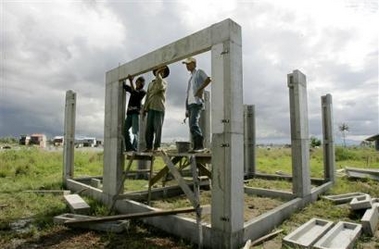|
Homes, livelihoods priorities in 2nd year of tsunami reconstruction
(AP)
Updated: 2005-12-28 10:56
Jerji Naskaputra and his team work night and day in this Indonesian province of Aceh turning out houses for survivors of last year's tsunami. And with some 400,000 people still homeless or in tents, they are gearing up for an even busier 2006.
That's fine with Naskaputra, a building contractor whose small pre-tsunami business located on the outskirts of this shattered city is now taking more orders from the International Organization for Migration than it can easily fill.
"I am really proud to be part of the rebuilding of Aceh," Naskaputra said Tuesday. "The people are going to love these houses."
Aid agencies and governments acknowledge they got off to a slow start in rebuilding after the tsunami crashed into coastal communities in 12 nations on December 26, 2004, leaving 216,000 people dead or missing and more than 1 million homeless.
In part, the problem was the scale of the catastrophe. Entire villages were washed away, and corpses littered the streets. The first priority was getting food and basic shelter to survivors and preventing disease.
After the emergency stage was over, other problems were revealed. Land titles and other government records were destroyed or lost, hundreds of kilometers (miles) of roads and other infrastructure were washed away, and officials wary of future tsunamis sought to tighten regulations governing building on the coast.

Acehnese workmen fit prefabricated cement building blocks together to frame a house in an International Organization for Migrants (IOM) project Tuesday, Dec. 27, 2005 in Cot Paya village outside Banda Aceh, Indonesia. [AP] |
In Indonesia and Sri Lanka, long-running conflicts also complicated rebuilding. The hostilities quickly ceased in Indonesia's devastated Aceh province, simplifying aid delivery. But in Sri Lanka, disputes between the government and Tamil rebels who control sections of the north and east of the country have hampered relief and reconstruction.
Citing lessons learned in the first year, governments and aid agencies are now promising to speed up the pace of reconstruction, zeroing in on building homes for the survivors and helping them find jobs.
"What we can speed up, we are speeding up," Indonesia's President Susilo Bambang Yudhoyono said Tuesday. "But we must not sacrifice quality. I don't want tens of thousands of houses built and in one year's time they begin leaking."
Indonesia, by far the worst country hit, plans to build 57,000 of the 80,000 homes needed by the end of 2006.
At Naskaputra's factory, welders melt iron into molds for concrete foundation posts and carpenters saw timber for walls, door frames and supports. Trucks pick up loads of prefabricated house kits that can be put together in 10 days, said International Organization for Migration spokesman Paul Dillon.
"All the earlier problems have been straightened out and we started to hit full stride around 2{ months ago," said Dillon. "There is now a wave of houses that are coming on line."
But Sri Lanka, the second worst-hit country, faces new challenges in its efforts to rebuild amid fears the island is about to return to civil war despite a 2002 cease-fire with Tamil rebels wanting a separate homeland.
The government there has been widely criticized over its reconstruction blueprint, and with 78,000 houses needed, it also is struggling to find land on which to build them. After creating a "buffer zone" that banned much rebuilding on the coastlines, the government is faced with having to buy private property at market prices to house refugees _ something the cash-strapped government cannot afford to do.
"We are determined to move faster in 2006 and see that work is done better and faster," said government spokesman Anura Priyadarshana Yapa. "But we don't have a magic wand."
Damage in Thailand was less extensive, but was concentrated on the resort strip around Phuket island that was wildly popular with European tourists. Thousands of foreigners were caught in the waves, giving the disaster even broader international scope.
Despite a multimillion-dollar international advertising campaign, tourist bookings plummeted in 2006, as they did in the Maldives and Sri Lanka.
Supanee Wang-udom, assistant manager of the Phuket Grand Tropican Hotel, said Tuesday that before the tsunami hit its 399 rooms were all occupied. Now, occupancy rate is 40 percent. "I hope next year is better," she said.
Many resorts have been rebuilt, and hoteliers and tourism officials are optimistic that pre-tsunami levels will be reached by the next high season, which begins in November 2006.
The government's Tourism Authority of Thailand is predicting a 13 percent increase in overall tourism to Thailand in 2006, or 15 million visitors. A large number of these would be heading to the tsunami-hit areas.
In Indonesia, much of Aceh's west coast remains a wasteland of debris, squalid pools and shattered roads, but thousands of newly built houses now dot the landscape, their tin roofs shining under the tropical sun.
"I went from a tent, to barracks and finally to a home," said Lila, who moved in two months ago and who uses only one name. "I am really comfortable here."
|